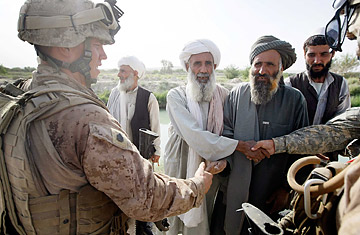
U.S. Marines from the 2nd Marine Expeditionary Brigade, RCT 2nd Battalion 8th Marines Echo Co., meet with Afghan villagers after driving Taliban fighters from the center of the village in Mian Poshteh, Afghanistan, on July 5, 2009
(2 of 2)
Western intelligence agencies suspect that Mullah Omar, leader of the Afghan Taliban, is hunkered down in a sanctuary near the city of Quetta, the capital of Baluchistan, with other key members of the Taliban leadership.
Pakistani authorities vehemently deny that the Afghan Taliban's key leadership structure is based in Quetta. And it stresses that limited resources force it to prioritize dealing with the Pakistani Taliban's domestic insurgency. "The situation is that Pakistan cannot fight all kinds of Taliban militants at once," says Hasan Askari-Rizvi, a political and military analyst. "Those Taliban who are challenging the Pakistani state's authority, they will be dealt with first." But critics believe that elements within the military establishment continue to discreetly support insurgent groups operating across the border in order to maintain Pakistan's strategic leverage in Afghanistan.
Pakistan's security establishment has never embraced the Karzai government, which it sees as dominated by the predominantly ethnic Tajik, Uzbek and Hazara forces of the India-backed Northern Alliance. And it fears that India is expanding its influence there through massive development projects and by using Afghanistan as a base from which to destabilize Pakistan.
Although Pakistani President Asif Ali Zardari has broken with his predecessor, General Pervez Musharraf, in embracing Karzai as an ally, his government continues to regard Afghanistan skeptically. Last week Interior Minister Rehman Malik accused the Karzai government of colluding with India to secretly back the Baluch insurgency inside Pakistan.
The Taliban regime had given Pakistan what local military strategists termed "strategic depth." A friendly regime in Kabul helped Islamabad counter New Delhi's clout in the region and helped relieve a sense of being encircled by India and its allies. Pakistani officials fear that as Pashtun political power has receded in Afghanistan, New Delhi's influence has grown at Islamabad's expense. It is widely alleged by Pakistani officials that India is using its four consulates along Pakistan's western border to foment the Baluch insurgency. Recent local propaganda has gone further, alleging that even the Taliban in Swat enjoys Indian backing — rumors that have helped rally public support against the militants.
The deeper Pakistani fear about the U.S. offensive is that the more it succeeds, the less chance Pakistan will have of influencing events in Afghanistan after the Americans and their allies leave. "Pakistan will find itself in a fix," says analyst Siddiqa. "What Pakistan doesn't want is a U.S. military victory in the short-term without securing its own long-term strategic interests." It is for this reason, many suspect, that Pakistan has not broken with the Afghan Taliban and other Pakistan-based militant groups fighting in Afghanistan.
Mohmand says the best outcome for the U.S. in Afghanistan is to negotiate an exit. "Fundamentally, the U.S. presence in Afghanistan is unsustainable," says the former Pakistan ambassador to Afghanistan. "At some point, they will have to be driven to the negotiations table. Pakistan will have to be included in the overall architecture of those talks. This can happen if basic objectives are met: there is some sort of functioning democracy, there is no space for al-Qaeda and it is a stabilized and peaceful country. If those benchmarks can be negotiated by regional powers, then the U.S. could begin to leave."
